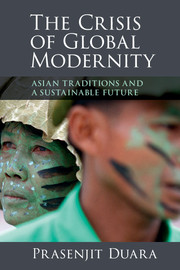Book contents
- Frontmatter
- Epigraph
- Contents
- List of figures and maps
- Preface and Acknowledgements
- Introduction
- 1 Sustainability and the crisis of transcendence
- 2 Circulatory and competitive histories
- 3 The historical logics of global modernity
- 4 Dialogical and radical transcendence
- 5 Dialogical transcendence and secular nationalism in the Sinosphere
- 6 The traffic between secularism and transcendence
- 7 Regions of circulation and networks of sustainability in Asia
- Reprise and Epilogue: of reason and hope
- Bibliography
- Index
Preface and Acknowledgements
Published online by Cambridge University Press: 05 January 2015
- Frontmatter
- Epigraph
- Contents
- List of figures and maps
- Preface and Acknowledgements
- Introduction
- 1 Sustainability and the crisis of transcendence
- 2 Circulatory and competitive histories
- 3 The historical logics of global modernity
- 4 Dialogical and radical transcendence
- 5 Dialogical transcendence and secular nationalism in the Sinosphere
- 6 The traffic between secularism and transcendence
- 7 Regions of circulation and networks of sustainability in Asia
- Reprise and Epilogue: of reason and hope
- Bibliography
- Index
Summary
For the roughly ten years I have been researching, thinking about and writing this book, I was sure I wanted to call it “Transcendence in a Secular World” accompanied by a subtitle that included Asian traditions and sustainability. My editors at Cambridge University Press wisely counseled me to change the title to “The Crisis of Global Modernity.” Since the latter better captures the imperative of the work, I quickly saw the wisdom of their advice. However, in my personal journey, it remains a book that seeks to understand the wellsprings of human commitment to a larger good beyond or ‘after’ religion and across various historical circumstances. The existence of the so-called altruism gene is a neutral matter because epigenetic conditions may allow it to be expressed in many ways or not at all. Thus, if the book is first of all about the crisis of sustainability, it is also about the crisis of transcendence and the search for sources and resources of self and communal regeneration in historical cultures.
A book composed in the later stage of one’s career cannot but also represent a stock-taking of one’s previous writings, recognizing how ideas and materials that once seemed to belong to a different realm fit into this. As such it draws on several of my earlier works and also more recently published essays. In each case, however, the original essay or material is transformed in this study. The database has been empirically expanded and the arguments intellectually developed to contribute to the overall theses of this book.
- Type
- Chapter
- Information
- The Crisis of Global ModernityAsian Traditions and a Sustainable Future, pp. ix - xPublisher: Cambridge University PressPrint publication year: 2014

